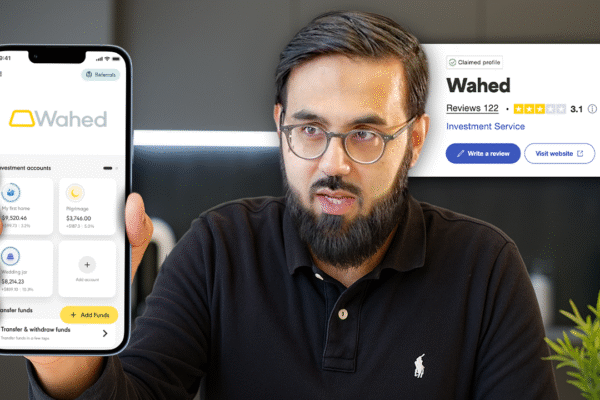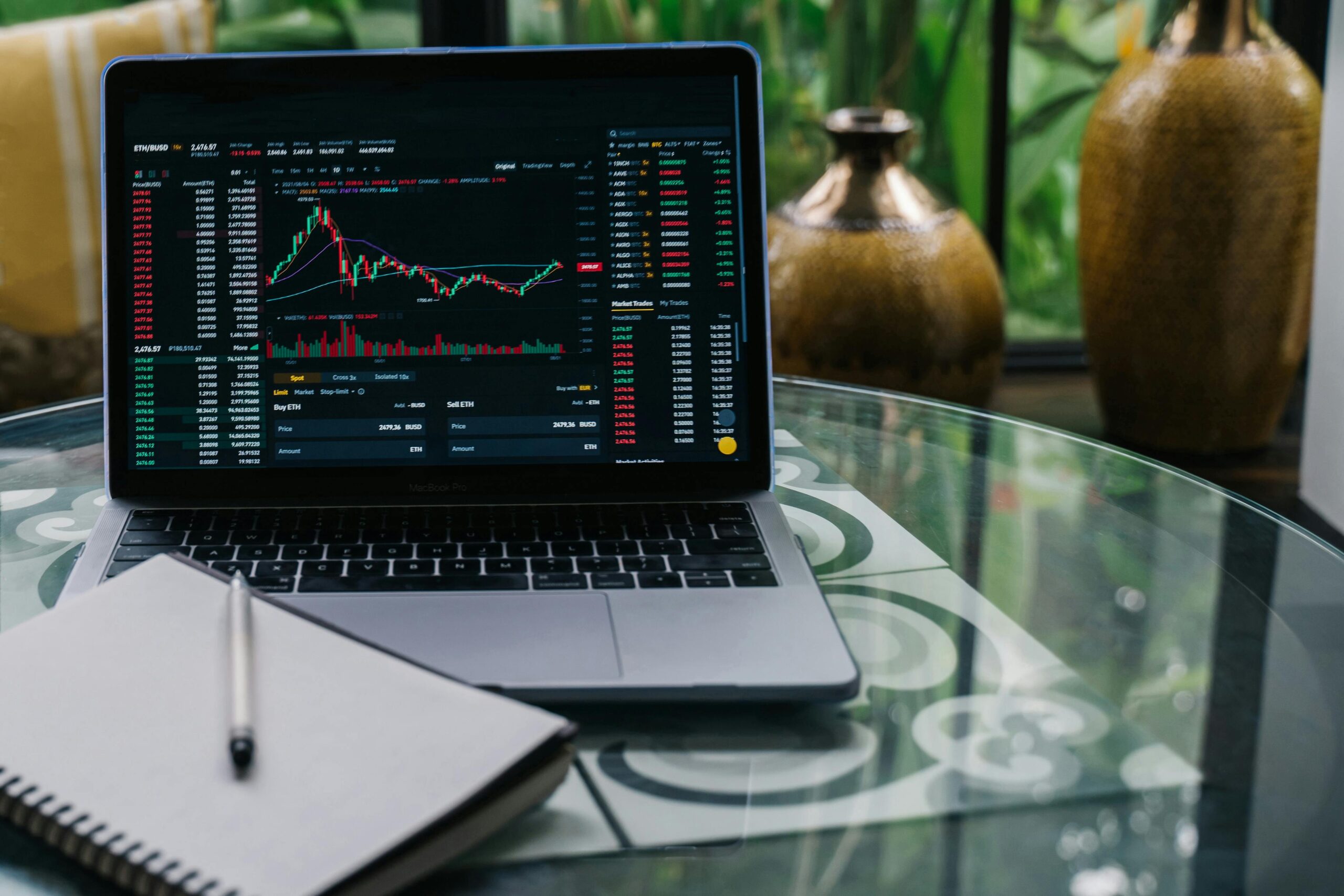
Wahed Invest – A Detailed Review & How to Use It (2025)
24 July 2025 15 min read

IW
IFG Staff Writers
7 min read
Last updated on:
Scroll through YouTube, TikTok, or Twitter and you’ll see the same piece of financial advice repeated over and over: “Just put your money in the S&P 500.” It’s the go-to recommendation for investors worldwide, praised by everyone from legendary investors such as Warren Buffett to your everyday personal finance influencers.
The problem is, as Muslim investors, we have to be very careful of what we listen to online, especially when it’s coming from non-Muslims. We have an extra layer of diligence to apply; making sure what we invest in is actually halal.
So in this article, we’ll cover:
The S&P 500, launched in 1957, is simply an index that tracks the 500 biggest publicly traded companies in the U.S. It covers all the major parts of the economy, from tech and healthcare to energy and banking and includes giants like Microsoft, Apple, Amazon, Nvidia, and Tesla. Because it tracks the 500 biggest companies across all the major industries, the S&P 500 is often used as a simple way to judge how the U.S. economy is doing. [1]
You’ll often hear big names like Warren Buffett, Dave Ramsey, and even influencers like Graham Stephan recommend the S&P 500. But why is it so popular?
So this all sounds good so far but for Muslims there is one key question that we still haven’t answered: Is it even halal to invest in?
The S&P 500 isn’t halal as nearly half of its companies fail modern shariah compliance standards, either because:
You can learn more about the screening criteria via this article on shariah-compliant stock screening.
The good news is there are shariah-compliant alternatives that aim to replicate the S&P 500’s performance while excluding the haram elements.
These come in the form of ETFs (exchange-traded funds). An ETF is simply a basket of stocks you can buy in one go, instead of purchasing each company individually. You can read more about how they work in our complete guide to halal ETF investing.
We’ll be looking at three leading halal ETFs: SPUS, HLAL, and ISDU. We’ve summarised the key differences between them in the table below, where we have compared their:
Launched in 2019, SPUS offers filtered exposure to the S&P 500 by removing companies that don’t meet shariah standards. It typically holds 220-250 stocks, maintaining wide coverage across large U.S. companies. [4]
SPUS is the most popular halal alternative to the S&P 500, with around $1.4 billion in assets under management (AUM). Over the past five years, it has outperformed the other halal ETFs and even the S&P 500 itself.
Its expense ratio sits at 0.45%, which is higher than SPY (the closest proxy to the S&P 500) because SPY benefits from much larger economies of scale. Compared to the other halal options, SPUS is slightly cheaper than HLAL but more expensive than ISDU.
HLAL, launched by Wahed, is another popular halal S&P 500 alternative. Its performance has been solid but still trails both SPUS and the S&P 500. HLAL also comes with the highest expense ratio of the three at 0.50% [7]. You can read more about Wahed in our full Wahed review.
ISDU has been around longer than both SPUS and HLAL and takes a slightly different approach in how it screens and selects companies. However, its performance has been the weakest of the three halal ETFs. On the positive side, ISDU offers the lowest expense ratio at 0.30%, making it cheaper than both SPUS and HLAL.
It’s also worth highlighting a deeper issue with both the S&P 500 and its shariah-compliant alternatives: their links to companies involved in the atrocities in Gaza. This is a serious topic that deserves its own discussion, which we’ve covered separately in our article on whether Islamic investment funds are complicit in genocide.
In short, current shariah screening only checks that companies are not directly involved in interest-based finance, alcohol, gambling, pork, or adult entertainment. Additional filters are applied for things like debt levels and interest income. What these screens don’t consider, however, is ethical or political alignment. That means a company could supply uniforms or equipment to the Israeli military and still pass the shariah screens, as long as it meets the financial and sector-based criteria. This gap is why many argue that shariah screens should be paired with broader ethical considerations when it comes to investing.
The good news though is that there are tools such as Zoya and Amal Invest that can help you align your investments more closely with BDS principles. However they function differently and come with their own trade-offs which we explore in our other article.
Most people only think about public equities when it comes to investing, but that is just one piece of the puzzle. Private markets are actually larger than public ones, and they open up a wide range of halal opportunities for Muslim investors who want their money to reflect their values.
Private markets simply mean investments that are not listed on a stock exchange. The benefit is greater choice and flexibility in the types of businesses and assets you can back. The downside is they are less liquid, which means it can take longer to cash out and you do not have the same freedom to buy and sell as you would with a stock or ETF. Even so, the private market space is broad and full of options worth exploring:
The S&P 500 is the world’s most talked-about investment, but for Muslim investors it is not just about performance. It is also about whether it is halal. The reality is that the standard S&P 500 is not shariah-compliant. The good news is there are alternatives like SPUS, HLAL, and ISDU that remove the most obvious impermissible companies, although each has its own trade-offs in terms of performance and fees.
It is also important to remember that investing does not begin and end with the stock market. There are plenty of halal opportunities in private markets too, from real estate and sukuk to private equity and venture capital. These options give you more ways to grow your wealth in a way that stays aligned with your principles.
At the end of the day, the goal is not to follow whatever is trending online. It is to invest in a way that builds your future, stays halal, and feels true to your values.
If you want to learn more about halal investing and how to build a diversified portfolio, download our free Halal Investment Checklist; it’s a practical, step-by-step tool to get you started. Also join the conversation and share your thoughts in the comments below.
[1] CFI, The S&P Sectors, URL: https://corporatefinanceinstitute.com/resources/valuation/the-sp-sectors/
[2] Investopedia, S&P 500 Average Returns and Historical Performance, URL:
https://www.investopedia.com/ask/answers/042415/what-average-annual-return-sp-500.asp
[3] AAOIFI Shariah Standard No 21 – Financial Paper. https://aaoifi.com/ss-21-financial-paper-shares-and-bonds/?lang=en
[4] SP Funds, SPUS The SP Funds S&P 500 Sharia Industry Exclusions ETF, URL: https://www.sp-funds.com/spus/#why
[5] SP Funds, SPUS The SP Funds S&P 500 Sharia Industry Exclusions ETF, URL:
https://www.sp-funds.com/spus/#why
[6] Sum Growth, Wahed FTSE USA Shariah ETF, URL: https://www.sumgrowth.com/etf-profile/invest-in-HLAL-etf.html
[7] Best ETF, Wahed FTSE USA Shariah ETF, URL: https://www.bestetf.net/etf/HLAL/
[8] iShares, iShares MSCI USA Islamic UCITS ETF, URL: https://www.ishares.com/uk/individual/en/products/251393/ishares-msci-usa-islamic-ucits-etf

24 July 2025 15 min read

16 July 2025 5 min read

05 June 2025 7 min read
Leave a Reply